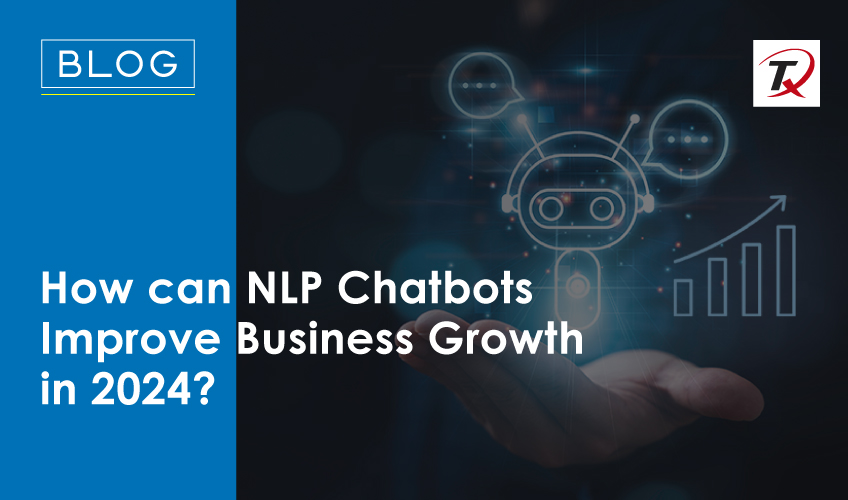Table of Contents
- Role of NLP Chatbots in Business in Business Growth
- Types of Chatbots
- NLP Chatbots Success Stories
- Challenges with NLP Chatbots Integration
- How can Tx help with Chatbot Testing?
- Summary
In the ever-evolving digital environment of communication technologies, consumers now prefer to connect with businesses through multiple channels. NLP chatbots are at the top of the communication channels list among these technologies. Why? Because of their ability to transform businesses’ interactions with customers, streamline operations, and enhance user experiences. By 2025, the chatbot market will exceed $1.25 billion, showing this technology’s rapid adoption and effectiveness across industries. Also, the chatbot’s efficiency in handling customer engagements is evident as businesses confirm handling 75-90% of customer queries via automated systems. It helps optimize customer service operations and saves billions in transaction costs.
As we are almost in the middle of 2024, adopting NLP chatbots is no longer a trend but a strategic necessity for businesses to enhance CX and operational efficiency. The world has come far from the first-ever chatbot, ELIZA, to today’s Amazon ALEXA.
Role of NLP Chatbots in Business in Business Growth
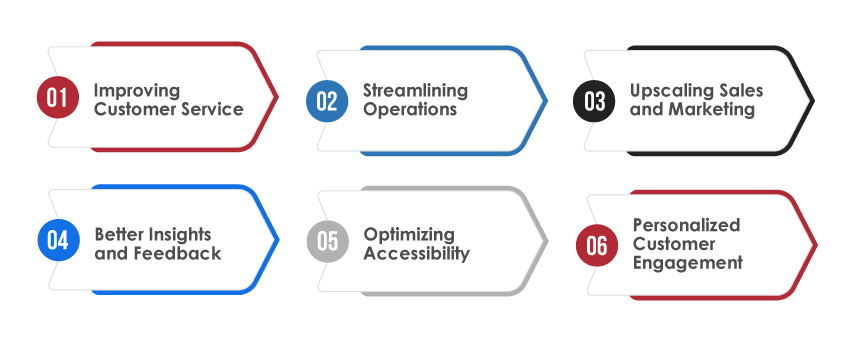
Everyone must be familiar with Alexa, Siri, and Google Assistant. All three are examples of AI-powered chatbots, and they are everywhere. Chatbots assist you if someone wants to order a pizza or book a hotel. But what exactly is a chatbot, and why do businesses need it?
A chatbot is a software program that utilizes advanced algorithms to facilitate human-like user conversations. They leverage ML, NLP, and AI technologies to analyze, comprehend, and respond to user queries. In today’s digital age, businesses increasingly integrate AI chatbots within their websites, mobile applications, and other systems to improve services and operations. Following are some of the factors that show the role of NLP-powered chatbots in facilitating business growth in 2024:
Improving Customer Service:
Chatbots play a crucial role in improving customer service. They allow businesses to handle queries 24/7, responding instantly to common questions. It speeds up customer engagement and frees employees to handle complex issues, thus improving overall CX. According to studies, chatbots can handle 90% of customer services, reducing response times and improving efficiency.
Streamlining Operations:
Chatbots significantly improve operational efficiency by automating routine tasks like order processing, providing essential customer support, and appointment scheduling. They also help reduce operational costs. For instance, AI chatbots can save businesses billions in transaction costs by automating customer interactions and backend operations.
Upscaling Sales and Marketing:
By syncing chatbots with the sales process, chatbots can enhance conversion rates. Businesses can engage with customers by offering personalized recommendations based on their preferences and behavior. Chatbots also help in lead generation, qualifying prospects via interactive and engaging conversations, thus delivering higher-quality leads into the sales funnel.
Better Insights and Feedback:
Chatbots help collect valuable feedback and provide insights into customer behavior. They can gather data and analyze trends via regular customer interactions to help businesses tailor their services to meet customer demands and preferences. Chatbots follow a data-driven approach to enable companies to make informed decisions for improving products and services.
Optimizing Accessibility:
Chatbots allow businesses to become customer-centric, offering support via multiple channels like social media, mobile apps, and websites. This omnichannel presence ensures customers with 24/7 assistance whenever and wherever they require it. In return, it enhances the overall CX and improves brand loyalty.
Personalized Customer Engagement:
One of the key benefits of NLP chatbots is that they facilitate personalized customer engagement. They allow businesses to analyze past conversations and understand customer’s preferences. It allows them to tailor responses and recommendations to customers. As a result, customers feel connected with the brands when they receive personalized recommendations. It makes them feel valued, which directly impacts the brand image.
Types of Chatbots
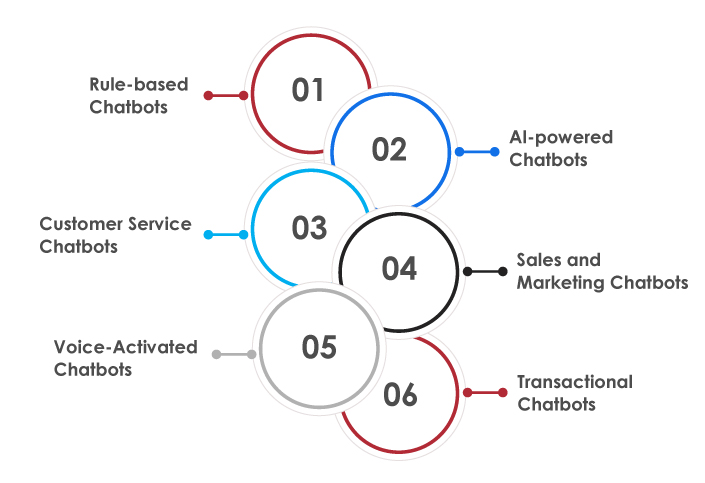
Although AI chats is not a recent concept, there are a huge number of programs and NLP tools that facilitate their development. Understanding chatbot types would allow businesses to deploy them strategically to maximize efficiency, enhance CX, and drive engagement. The following are seven types of chatbots that businesses can leverage in 2024:
Rule-based Chatbots:
Follows pre-defined pathways to respond based on specific rules or scripts. They can handle simple tasks like answering FAQs or guiding users through processes.
AI-powered Chatbots:
Leverage advanced technologies like ML and NLP to understand and process human language and response in a conversational manner. These bots learn by interacting with users to improve their responses over time so they can handle complex tasks like personalizing customer interactions and addressing diverse user queries.
Customer Service Chatbots:
Handle many customer queries, from basic questions to more involved troubleshooting. They are specifically designed to enhance the customer support process.
Sales and Marketing Chatbots:
Tailored to drive sales and marketing efforts, these chatbots initiate contact with potential leads to provide product recommendations based on user behavior. They facilitate personalized marketing messages and offer instant responses, significantly improving conversion rates.
Voice-Activated Chatbots:
These are helpful where hands-free interaction is preferred. They understand spoken commands and respond verbally, making them ideal for smart home products, driving, or using mobile devices.
Transactional Chatbots:
Designed to assist users in the transaction process, these chatbots perform actions like making purchases, booking tickets, and scheduling appointments.
NLP Chatbots Success Stories
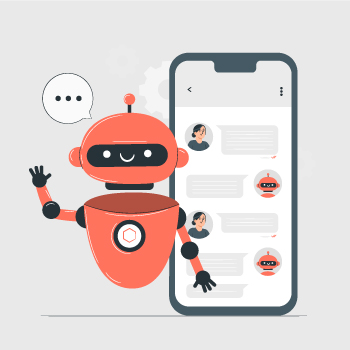
Various companies have successfully implemented NLP chatbots in their customer service.
• HubSpot, for example, has an integrated NLP chatbot to qualify leads and book meetings.
• Then there’s Dollar Shave Club’s NLP chatbot, which offers continuous assistance in resolving customers’ queries. It ensures people have access to support services regardless of their time zone.
• The NLP chatbot “Dom” on Domino’s website and mobile app allows visitors to place pizza orders using the CTA phrase “Order with Dom.”
• Sephora, one of the leading beauty brands, introduced its “Virtual Artist” chatbot on its app and Facebook Messenger. This NLP-powered chatbot assists customers with finding and trying makeup virtually.
• HealthTap, a health tech company, utilizes an NLP chatbot to provide basic medical advice to users. The bot deciphers user input about symptoms and guides whether to seek professional care or handle issues through self-care.
• Capital One, a financial services company, developed Eno, a chatbot that assists customers with banking questions via text messages. It helps users track spending, manage accounts, and detect potential fraud.
• H&M introduced a chatbot on their app to allow customers to select outfits based on their preferences and wardrobe selections. It offers fashion advice and personalized recommendations to enhance the shopping experience and increase customer engagement rate.
Challenges with NLP Chatbots Integration
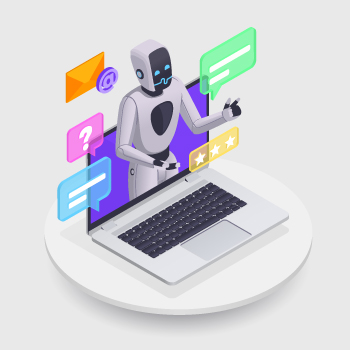
Integrating NLP chatbots within existing business operations poses several challenges that organizations must resolve to leverage this technology fully. Following is some of the common challenges associated with NLP chatbot integration:
• NLP chatbots sometimes struggle to decipher complex or ambiguous user queries. It creates misunderstandings, leading to irrelevant responses that frustrate users and harm CX.
• They lack the deep contextual awareness necessary to provide accurate conversation responses, which requires understanding previous interactions or external factors.
• Implementing NLP chatbots requires vast amounts of training data, which is resource-intensive. Without high-quality data, their effectiveness will be limited.
• Chatbots handling personal or sensitive user data raises privacy and security concerns. Businesses must ensure compliance with data protection laws to secure chatbots from potential breaches, which is a critical challenge.
• NLP chatbots can mimic human conversation, but achieving a natural human-like flow is challenging. Users can easily tell whether they are conversing with a bot or a human.
• To address the above-mentioned challenges, businesses must partner with a dedicated QA company with AI chatbot integration and testing expertise. This will help enhance customer interaction quality and operational efficiency.
Summary
In 2024, NLP chatbots are crucial for businesses to optimize communication and operations across various sectors. These AI-driven tools personalize customer interactions, streamline services, and enhance user experiences, positioning themselves as crucial in digital communication. From the first chatbot, ELIZA, to modern examples like Amazon’s Alexa, chatbots have evolved to support diverse business functions, including customer service, sales, and marketing. Businesses leverage chatbots, such as rule-based or AI-powered, to improve customer service, operational efficiency, and overall customer experience, highlighting their transformational impact and essential role in business growth. However, to ensure the successful integration of chatbots within business operations, one must partner with a reliable QA partner like Tx.
How can Tx help with Chatbot Testing?

Tx is one of the leading next-gen software testing services providers that deliver end-to-end chatbot testing services for businesses across domains. Our dedicated team of AI testing experts will assist you with NLP-powered chatbot implementation within your business operations. Here’s how Tx can transform the efficiency and effectiveness of your chatbot testing and implementation process:
• Our chatbot testing services cover specialized testing for regression, API, conversation flow, domain-specific, crowd, performance, security, and NLP & cognitive service.
• We utilize industry-leading chatbot testing tools such as BOX, Test My Bot, Botium, Chatbot Test, etc.
• We use automated testing tools and in-house accelerators, such as Tx-Automate, Tx-HyperAutomate, Tx-SmarTest, etc., to identify potential issues before they affect your users.
• Our teams leverage advanced algorithms to mimic real-world user interactions, ensuring your chatbot can handle various queries and conversations.
• Our chatbot testing services cover voice and chat automation, UX testing, OS integration, NLP, CI/CD integration, and data-driven insights.
To know more, contact our QA experts now.
The post How can NLP Chatbots Improve Business Growth in 2024? first appeared on TestingXperts.

